For decades, Los Angeles has been protected by a Mecha Man. When the first Mecha Man, Robert Robertson (yes, that is his real name), died in the line of duty, his son took up the mantle, and so it was with his son as well, Robert Robertson the third (again, yes, that is his real name. They did that three times.). That tradition is about to end, however, as the current Mecha Man’s suit is destroyed in a botched attempt at vengeance. Out of money and options, it’s time for Mecha Man to step out of the spotlight and help a new generation of heroes protect the city. Too bad he’s stuck with a dysfunctional group of former supervillains instead.
Dispatch had my attention from the very moment I booted up the demo. Its premise is incredibly interesting, asking you to dispatch the right members of your team to solve incidents around the city, and it’s made by former TellTale Games staff, so you know you’ll be making dialogue choices with future, unseen consequences. The first two episodes of Dispatch lay all the cards on the table, and while it’s not a perfect hand, it’s still a fun and interesting time.
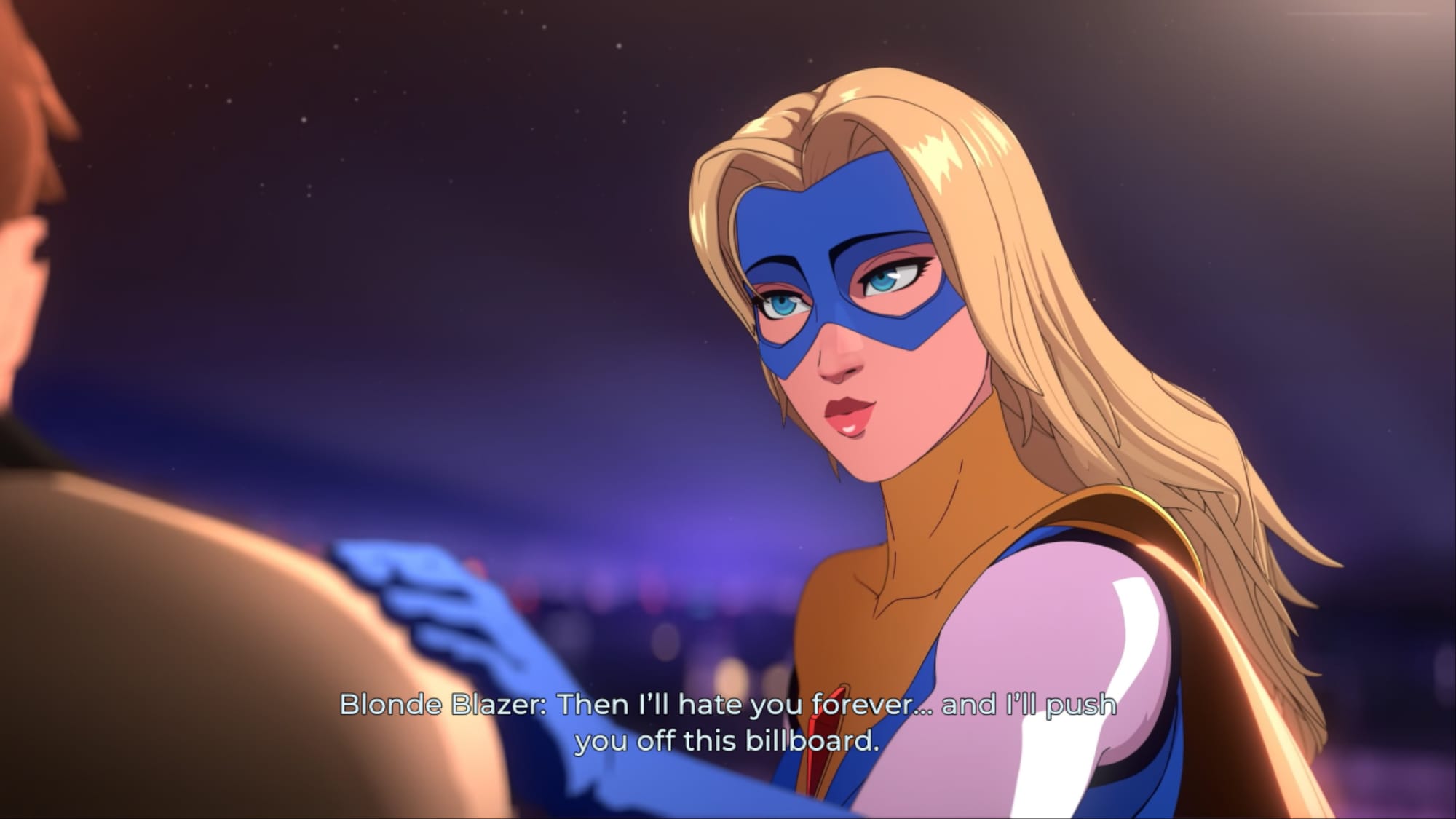
The game is very cleanly divided into two types of gameplay: the TellTale style of dialogue choices and quick time events (the latter of which you can turn off if you just don’t want to), and the dispatching gameplay. Let’s start with the dispatching. In these segments, Superhero Dispatch Network (SDN) subscribers will report incidents all around the city. These can be anything from getting a cat out of a tree or helping an old lady cross the street to break-ins and fires. Your job is to pick the right loser- er, hero for the situation to get the best chance of success. For example, you don’t want to send a combat-oriented hero, such as Flambae, to diffuse an argument at a bar. Instead, you’d want someone like Prism or Punch Up to talk things through or perhaps Golem to put a definitive stop to things before they escalate.
Once a hero has been dispatched, they’ll travel to the site and get it done. Sometimes you’ll need to advise on the best course of action, again taking their skills and preferences into account with what you decide. Some decisions can also be locked behind a certain hero’s powers, so, if they’re not there, you can’t pick that option. Once the job’s done, it’s time to review the outcome. Here, you’ll see a graph depicting the stats the job needed overlapped with the stats of the team you sent. A puck will bounce around the graph for a bit, and if it lands in an overlapped section, you succeed; if it doesn’t, you fail. If the job stats are completely within the heroes’ stats, it’s an automatic success, but that’s pretty rare. It’s a decent system, though it can be deflating when the puck lands in the one, tiny bit of the graph that’s not overlapping.
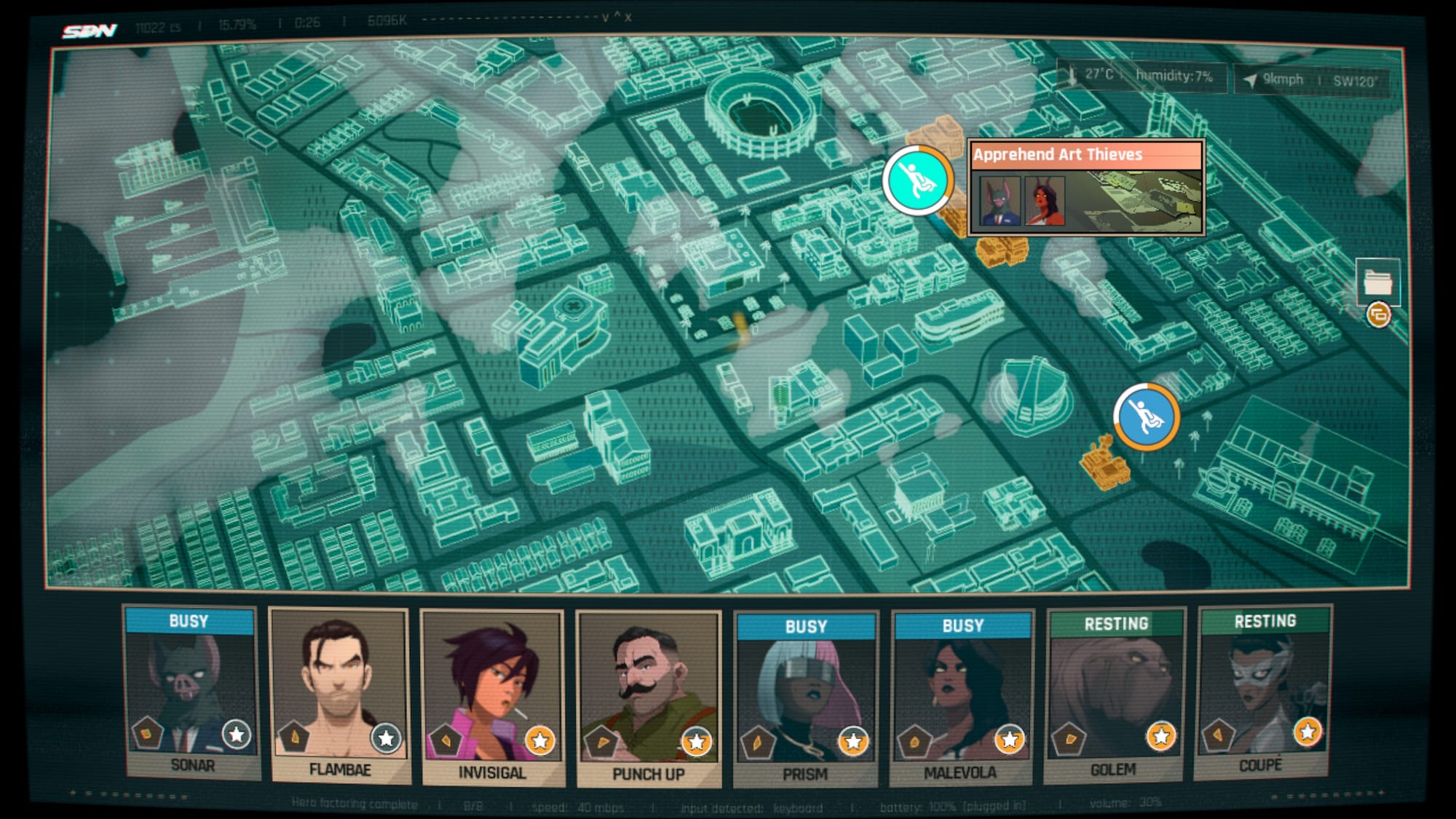
Despite being the more involved portion, time spent dispatching is far, far outweighed by the cinematic adventure game half of things. For now, I think that’s a good thing, as dispatching just doesn’t have much effect on what you’re really here for: the story.
Dispatch does a fantastic job of getting you invested quickly. The game opens on what you initially think is a therapy session, with Robert talking with someone off-screen about his father’s passing, but it’s slowly revealed that this is more of a torture/interrogation scene that got a bit off track. Mecha Man has kidnapped one of Shroud’s, his father’s killer, goons, and wants to know where the villain is, presumably to kill him. You have plenty of dialogue options to determine how Robert feels about his dad and if he decides to drop his prisoner off his apartment’s balcony once he has the information he needs. That last one matters pretty quickly, because when you arrive at Shroud’s base your torture victim might already be there waiting for you and some sweet payback. Of course, the Mecha Man suit is destroyed in the fight, Robert is in a coma for a few months, and when he finally comes out, he’s got basically nothing left.
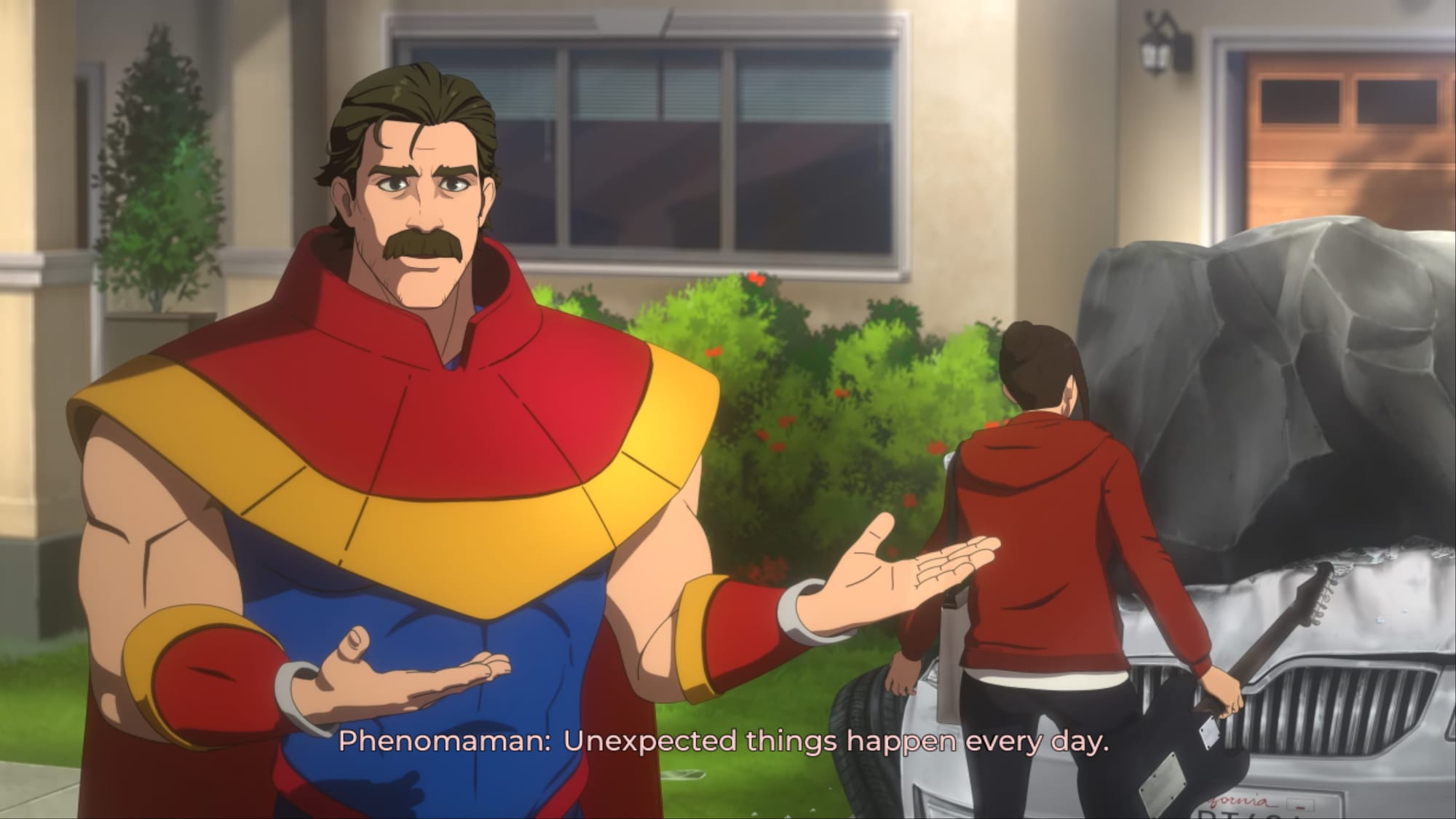
That’s when Blonde Blazer enters the picture, offering him a job at SDN in exchange for rebuilding the Mecha Man suit. From there it’s easy to see where things are going to go, Robert and Blazer will have some sort of romance despite her having a boyfriend, he’ll grow close to his team of misfits before they’re devastated find out he’s Mecha Man and only here to repair his suit, and then he’ll prove himself to them through some sort of sacrifice. None of that has happened yet, it’s just what I’m assuming from Episodes 1 and 2, but even if it plays out exactly like that, I’m sure it’ll still be interesting to watch. The reason stories like this are predictable isn’t because they’re bad; it’s because we’ve seen them so many times since the structure works really well. As long as the characters remain charming and fun to watch on screen, Dispatch will be a good time.
A lot of that depends on the performances and animation, which are a bit of a mixed bag so far. Aaron Paul as lead Mecha Man/Robert Robertson is absolutely killing it, as are the rest of the professional actors like Laura Bailey (Invisigal) and Erin Yvette (Blonde Blazer). However, I’m still skeptical about some core members of the cast played by actors coming from the YouTube or influencer space, like Seán McLoughlin (Punch Up), Alannah Pearce (Malevola), and someone by the name of Thot Squad as Prism. These characters haven’t really had much screentime yet, so I’ll remain open-minded, but so far their performances feel noticeably weaker than the more professional cast. Everyone has to start somewhere, and it’s not like any of them are bad, but it does feel like the casting here is somewhat just for cameos, and their characters won’t really matter in the long run, which is disappointing. I hope to be proven wrong in future episodes.
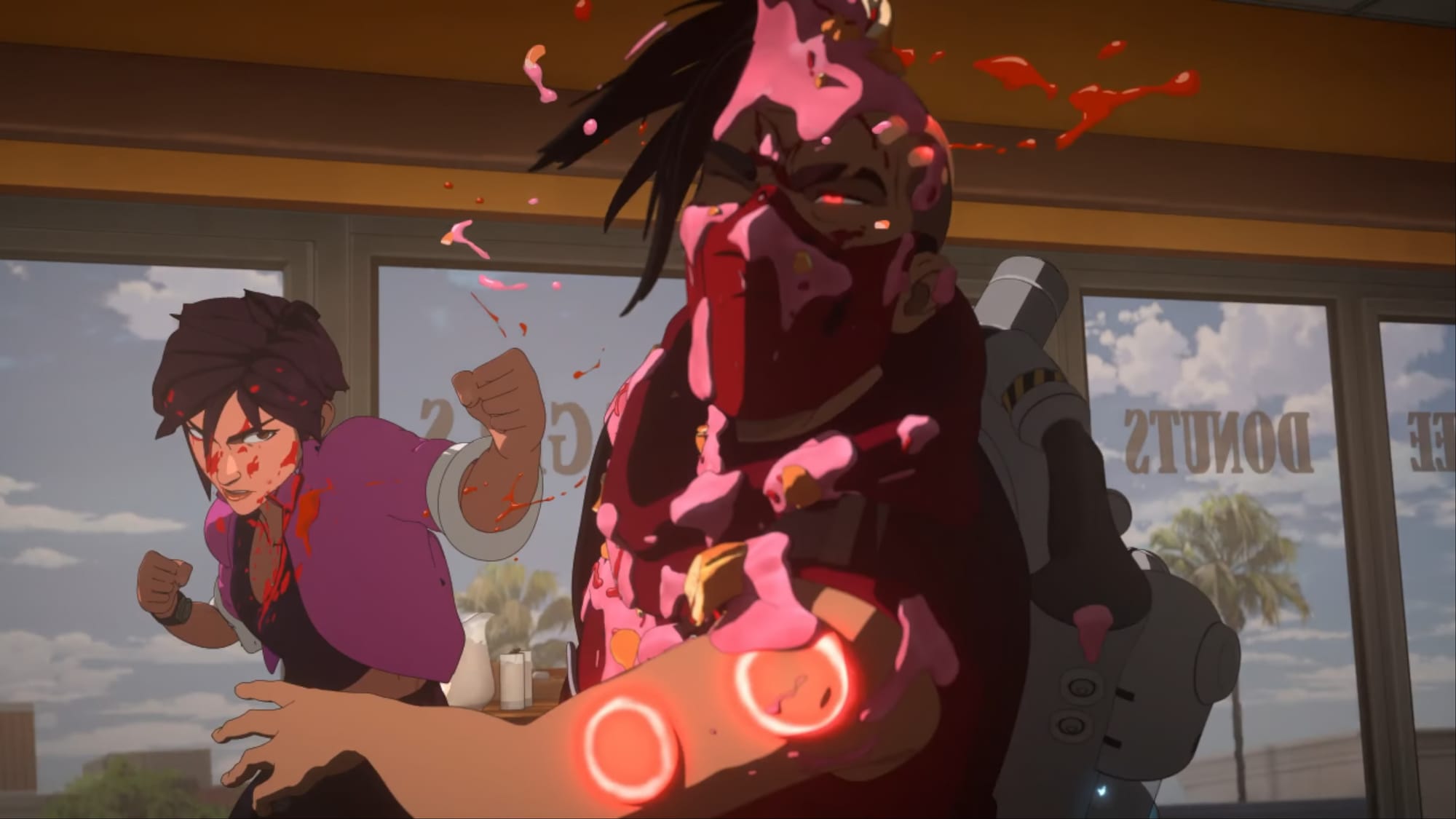
Continuing on with sound, while the focus is on the dialogue and voice acting, I found the sound effects really jarring. They just sound super weak and flaccid, like when a hail of gunfire is hitting the Mecha Man suit, you’d expect it to have impact, but it sounds more like a light rain hitting your roof. It really took me out of the game more than once.
On the flip side, the game looks incredible - at least in the foreground. Dispatch really nails the colorful, flat look of some comic books in its environments and main cast, but if you try and look at characters in the background or who aren’t the focus of a scene, you’ll find that they look noticeably worse in terms of texture quality and animation. In particular, a reporter during the press conference in Episode 1 just looked like he wasn’t finished yet. It doesn’t happen very often, but you’ll certainly notice when it does, again taking you out of the experience.
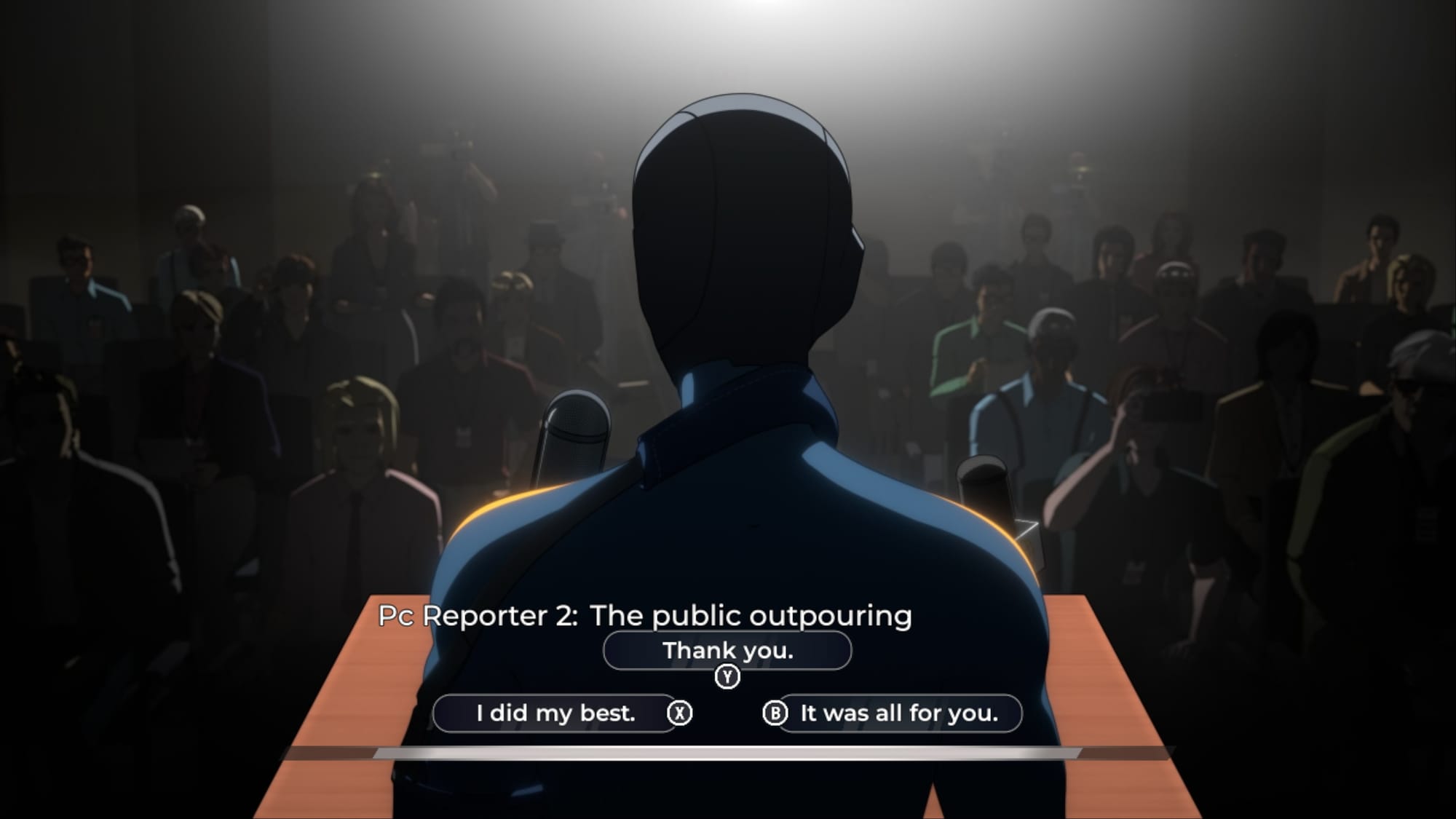
So far, Dispatch feels like watching some prestige television, albeit with a somewhat limited budget. Each episode is about an hour, but it flies by as you make choices and get invested in the characters and storyline. Right now, it’s less game and more TV show, but the TV show parts are so enjoyable to watch that I don’t really mind.





















